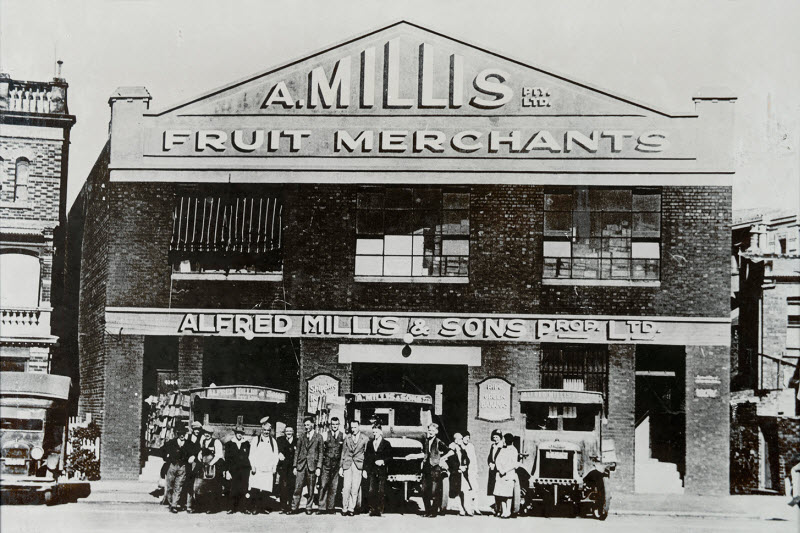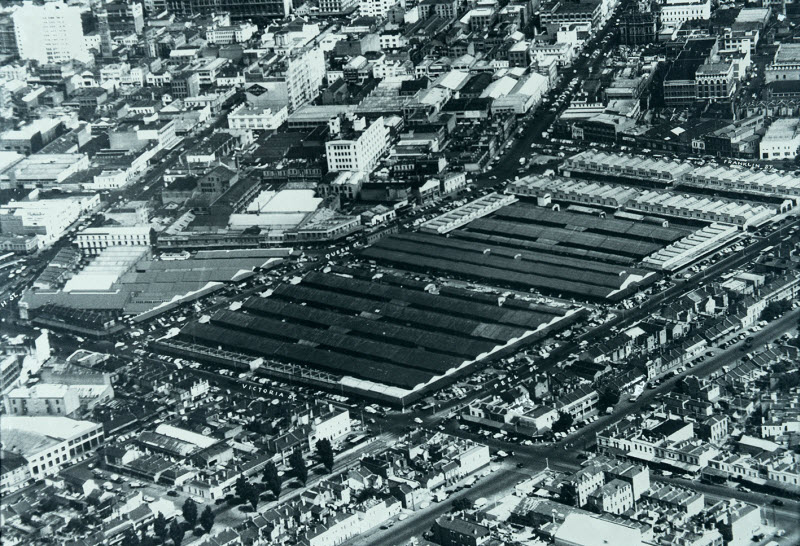For a general inquiry please contact :

Melbourne’s first official fruit and vegetable market was the Western Market – established in December 1841, a mere six years after settlement – on a site bounded by Market, Collins and William Streets, and Flinders Lane. The Western Market traded for 90 years. It started as a general market but gradually grew into a wholesale market. As the city developed, the Eastern Market at Bourke and Exhibition Streets opened in 1847, gradually attracting market gardeners and fruit merchants. In the early 1860s, it was estimated that more than 1000 growers used the Market at one time during the year. Eventually, both Eastern and Western Markets were merged into Queen Victoria Market, which became the hub for Victoria’s wholesale and retail fruit and vegetable industry.
In 1905, Alfred James Millis Senior formed and became the President of the Fruit Merchants and Commission Agents Association. Alfred was the owner of the wholesale business Alfred Millis & Sons Pty Ltd at the Western Market. “The Association was started for the betterment of everyone in the industry,” says Robert Millis, Alfred’s great-grandson and Fresh State past President. “At the time, it was unruly, and wholesalers needed an organisation to represent them and provide leadership.”
The objectives of the Association, according to the 1905 Constitution was to:
- Extend the interests and to preserve the unity and purity of the fruit trade;
- Promote the common business interests of its members, and to establish and maintain more intimate relationships between them; and
- Take united action upon all matters affecting the welfare of the trade at large, particularly in regard to terms and discounts.
It was this Constitution and Association that sowed the first seed for what is now known as Fresh State Ltd.
The Association’s name was changed to the Victorian Chamber of Fruit and Vegetable Industries in 1944, in line with like-minded organisations in other states. This then led to the formation of the Commonwealth Chamber of Fruit and Vegetable Industries. The Commonwealth Chamber was made up of State Chambers to form a united stance in their approach to government. To its credit, the Commonwealth Chamber (also known as the Australian Chamber) continues strongly today in the new name of Fresh Markets Australia.
Even from the very early days, the Victorian Chamber fought on behalf of its member’s rights and represented its members to government and the broader industry with a united and strong voice. The Chamber took a leading role in discussions following the Royal Commission in the 1950’s and the drafting of new legislation at the time. It was instrumental in providing options and research when the government was considering whether to expand or relocate from Queen Victoria Market and fought hard for better working conditions and hours of trade on behalf of wholesalers. In 1975, the five associations active in the Market (The Chamber, the Victorian Merchant’s Association, the Commission Agents, the Hard Produce Agents, and the Independent Merchants) merged and formed the Victorian Fruit and Vegetable Wholesalers Association. Today, years later, it is known as Fresh State Ltd and has not only maintained its base objectives and relevance in the Market but has also well and truly lasted the test of time.

Aerial View of the Footscray Wholesale Market site
By the 1960s, the Queen Victoria site could no longer accommodate both wholesale and retail functions. The controversial decision was made to move wholesale trading to the West Melbourne site (previously a swamp area) and build a new market to meet the industry’s needs. The purpose-built wholesale facilities at the Footscray Road site was officially opened on October 30, 1969. In April 1996, the National Flower Center was constructed on the site. Until then, flowers had been traded casually on the market floor on Tuesdays, Thursdays, and Saturday mornings.
After 46 years of operation at Footscray, the Melbourne Wholesale Markets in 2015 relocated to a new purpose-built facility in Epping, after a long eleven years in the planning. Like the Footscray move, the location change has been plagued by controversy. Many traders and retailers were unhappy about the new facilities, the location, and the government landlord’s handling of the site. In time traders have learned to adapt to the new conditions and facility. The Market has now been trading in Epping for five years, where Fresh State has continued to represent its members with a united voice and strives to uphold its objectives made in 1905.
Fresh State is always in continuous conversation with the landlord for better working conditions and trade on behalf of wholesalers and continues to engage with all industry stakeholders to ensure a viable and vibrant industry into the next hundred years.

